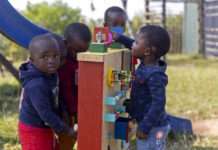Is South Africa a failed state?
Does business have more to contribute to the economy?
Do we have the will and the leadership skills to turn our economy around?
Does B-BBEE have a role to play in our economic recovery?
These were some of the questions tackled at the second Citizen Leadership Conversation hosted by top South African NPO, Symphonia for South Africa (SSA), in partnership with Business Management Consultancy, BEE Novation.
The virtual session featured South African thought leaders Professor Bonang Mohale, Adam Craker and Kolosa Madikizela, in conversation on the underlying issues preventing economic growth and prosperity in South Africa. CEO of Symphonia for South Africa, Komala Pillay, and Managing Director of BEE Novation, Lee du Preez, facilitated the session. Attendees included senior executives from large corporates in South Africa, entrepreneurs and members of civil society.
Is South Africa open for business?
Poll respondents were split on their views, with 41% believing that South Africa is open for business, while 13% believing the opposite. However, 46% of respondents replied with a ‘maybe’, demonstrating apprehension about the state of South Africa’s economy.
In response to this result, Professor Bonang Mohale, Chancellor of the University of the Free State and President of Business Unity South Africa, said: ‘’Twenty-eight years after the end of apartheid, South Africa is exhibiting signs of a failed state. I’m not surprised that 46% of our audience is on the fence – South Africa is in a spot of bother. For South Africa to be truly open for business, we need to create a nation of Nelson Mandela’s dreams. This starts with job creation that will lead to economic growth. If not, we will only succeed in the redistribution of poverty, not wealth.”
Adam Craker, CEO at IQbusiness, added: ‘’A zero growth economy cannot be comfortable for anyone. We need to change that by focusing on creating a better future for the youth.’’
When asked about whether South Africa could be considered a failed state, Craker referred to the last 10 years as a ‘’period of waste’’.
‘’A failed state is one where a political government has lost control and stewardship of its country. The social unrest back in July 2021, and more recently the fires that engulfed Parliament are indicators of a failed state. Six months on, electricity infrastructure is being sabotaged. Unless we arrest this decline, we will be sucked into an unpleasant vortex. Despite this, I am still optimistic that we can move forward.’’
Does Government have the skill set to create the right environment for business?
A telling 86% of respondents do not believe that the current government is equipped to create a country where business can flourish. This response is a strong indicator of the low level of confidence in government and raises doubt on South Africa’s ability to thrive.
In response to this high figure, Komala Pillay posed a challenge for the business community: ‘’How do we get out of the blame-game and create partnerships and collaboration, so that skills in government, business and civil society can be harnessed to solve the big issues of our country?’’
Prof Mohale, in agreement with Pillay, said: ‘’We need to be honest about the ‘diagnosis’ so that the ‘prognosis’ improves. Business needs to own the current situation because it has been complicit in its creation.’’
Attendee Shaun Le Ray, CEO of Verve Media Group, seconded the notion of collaboration, stating that: “Collaboration between business and government and transparency in business and government is the answer.’’
Attendee Grant Kelly, Executive Head at Nedbank, highlighted that business and not just government has a critical role to play in creating a successful economy: ‘’The South African economy was built on extraction, exploitation and exclusion. How does business now create a regenerative, reciprocal and representative economy? It will take a paradigm shift; one where business not only maximises shareholder value, but shared value.’’
Another attendee, Amos Kava, CEO of Registree, offered his solution to greater economic participation:
‘’Corporate SA is as guilty as government for perpetuating oppression and exclusion. Open industries and create an enabling environment for the underprivileged.’’
Adding to this, Kolosa Madikizela said: ‘’Public-private partnerships are key to effect change. And innovative solutions needn’t just come from CEOs. The solutions lie at grassroots level, in communities.’’
Is business taking B-BBEE and Corporate Social Investment as seriously as it should?
A resounding 91% of respondents believe that business is failing to take these transformation tools seriously, a response which is an indictment on business but also an opportunity
Attendee Selema Molopa gave clarity to this poll result: ‘’These tools can only work as an instrument to build the economy if we want them to. Economic growth is a long, difficult, trust-building process between business and citizens.’’
A riveting session with vigorous debate ended on a note of positivity with general agreement on the need for partnerships and collaboration, for citizen leaders to reshape the trajectory of our country, and for the need for true representation to harness the creativity and talents of all our people.
Madikizela concluded the session by emphasising: ‘’We are the solutions that we have been waiting for. Corporate citizens are stepping up and this is exciting for our future”.
If you would like to be part of future Citizen Leadership Conversations, and/or are interested in supporting the work of Symphonia for South Africa, please email [email protected].
For practical B-BBEEE business solutions, visit www.beenovation.com
About Symphonia for South Africa
Symphonia for South Africa’s mission is to mobilise active citizenship around the significant issues facing South Africans. In pursuing this, this internationally recognised social enterprise has launched a number of programmes and initiatives that contribute to developing leadership capacity, reducing inequality and ultimately creating a better future for all South Africans.
About BEE Novation
BEE Novation partners with businesses as they use B-BBEE, Employment Equity, the Youth Employment Service Initiative and Skills Development to increase their profitability and fulfil their purpose, mission and vision. The consultancy has a footprint in Durban, Pietermaritzburg, Johannesburg and Cape Town.












